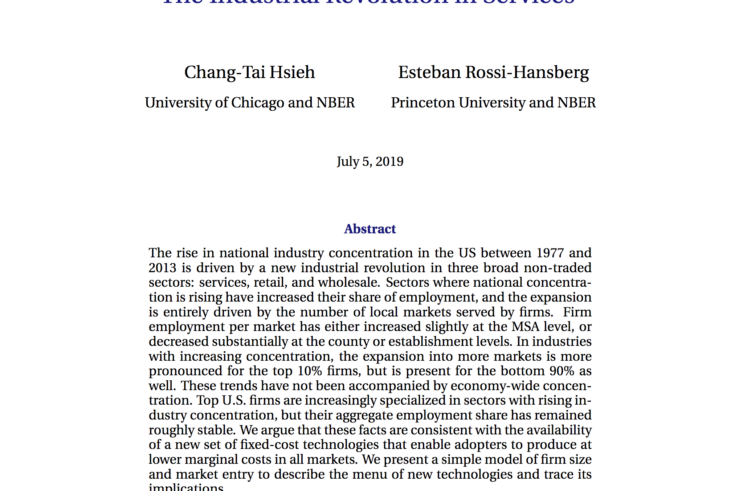Showing archive for: “Financial Regulation”
A Law & Economics Perspective on Ruth Bader Ginsburg
With the passing of Justice Ruth Bader Ginsburg, many have already noted her impact on the law as an advocate for gender equality and women’s rights, her importance as a role model for women, and her civility. Indeed, a key piece of her legacy is that she was a jurist in the classic sense of ... A Law & Economics Perspective on Ruth Bader Ginsburg
The Myth of the Cyber Barons
During last week’s antitrust hearing, Representative Jamie Raskin (D-Md.) provided a sound bite that served as a salvo: “In the 19th century we had the robber barons, in the 21st century we get the cyber barons.” But with sound bites, much like bumper stickers, there’s no room for nuance or scrutiny. The news media has ... The Myth of the Cyber Barons
Let’s (NOT) Stop All the Mergers: The Case for Letting the Agencies Do Their Jobs
Never let a crisis go to waste, or so they say. In the past two weeks, some of the same people who sought to stop mergers and acquisitions during the bull market took the opportunity of the COVID-19 pandemic and the new bear market to call to ban M&A. On Friday, April 24th, Rep. David ... Let’s (NOT) Stop All the Mergers: The Case for Letting the Agencies Do Their Jobs
Buyback Backlash: Is the Ban Non-binding?
[TOTM: The following is part of a blog series by TOTM guests and authors on the law, economics, and policy of the ongoing COVID-19 pandemic. The entire series of posts is available here. This post is authored by Eric Fruits, (Chief Economist, International Center for Law & Economics).] The Wall Street Journal reports congressional leaders have agreed to ... Buyback Backlash: Is the Ban Non-binding?
Income-contingent Loans as a COVID Policy Backstop
[TOTM: The following is part of a blog series by TOTM guests and authors on the law, economics, and policy of the ongoing COVID-19 pandemic. The entire series of posts is available here. This post is authored by Sam Bowman, (Director of Competition Policy, ICLE).] No support package for workers and businesses during the coronavirus shutdown can be ... Income-contingent Loans as a COVID Policy Backstop
Goodhart and Bad Policy
[TOTM: The following is part of a blog series by TOTM guests and authors on the law, economics, and policy of the ongoing COVID-19 pandemic. The entire series of posts is available here. This post is authored by Eric Fruits, (Chief Economist, International Center for Law & Economics).] Wells Fargo faces billions of dollars of ... Goodhart and Bad Policy
What Can the Stock Market Tell Us About the T-Mobile/Sprint Merger?
On Monday evening, around 6:00 PM Eastern Standard Time, news leaked that the United States District Court for the Southern District of New York had decided to allow the T-Mobile/Sprint merger to go through, giving the companies a victory over a group of state attorneys general trying to block the deal. Thomas Philippon, a professor ... What Can the Stock Market Tell Us About the T-Mobile/Sprint Merger?
The State AGs’ Investigation Against Google Needs to Put Consumers First
In mid-November, the 50 state attorneys general (AGs) investigating Google’s advertising practices expanded their antitrust probe to include the company’s search and Android businesses. Texas Attorney General Ken Paxton, the lead on the case, was supportive of the development, but made clear that other states would manage the investigations of search and Android separately. While ... The State AGs’ Investigation Against Google Needs to Put Consumers First
We Should Not Have Our Constitution Redesigned by Antitrust Lawyers
[TOTM: The following is the sixth in a series of posts by TOTM guests and authors on the politicization of antitrust. The entire series of posts is available here.] This post is authored by Kristian Stout, Associate Director at the International Center for Law & Economics. There is a push underway to punish big tech ... We Should Not Have Our Constitution Redesigned by Antitrust Lawyers
Big Ink vs. Bigger Tech
[TOTM: The following is the fifth in a series of posts by TOTM guests and authors on the politicization of antitrust. The entire series of posts is available here.] This post is authored by Ramsi Woodcock, Assistant Professor, College of Law, and Assistant Professor, Department of Management at Gatton College of Business & Economics, University ... Big Ink vs. Bigger Tech
What if rising concentration were an indication of more competition, not less?
An oft-repeated claim of conferences, media, and left-wing think tanks is that lax antitrust enforcement has led to a substantial increase in concentration in the US economy of late, strangling the economy, harming workers, and saddling consumers with greater markups in the process. But what if rising concentration (and the current level of antitrust enforcement) ... What if rising concentration were an indication of more competition, not less?
The Real Story about Amazon, Counterfeit Listings, and Minimum Advertised Price (MAP) Policies
These days, lacking a coherent legal theory presents no challenge to the would-be antitrust crusader. In a previous post, we noted how Shaoul Sussman’s predatory pricing claims against Amazon lacked a serious legal foundation. Sussman has returned with a new post, trying to build out his fledgling theory, but fares little better under even casual ... The Real Story about Amazon, Counterfeit Listings, and Minimum Advertised Price (MAP) Policies







